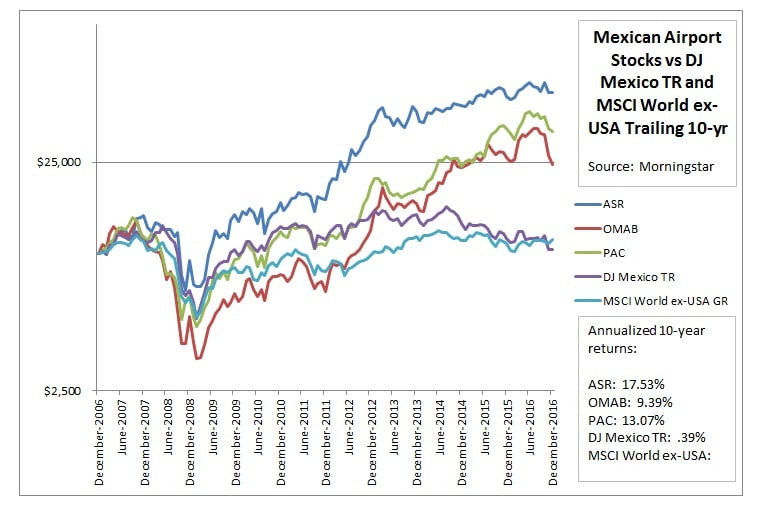A recurring theme in my posts is that oftentimes some of the best investment opportunities are not the “celebrity stocks” that get a lot of media attention, but rather the companies like WD-40 and industries like self-storage that are ignored, perhaps because they are boring, and even because few know they can invest in them.
One of the more interesting opportunities that few know about is investing in airport stocks. While it may seem strange to Americans, there are actually quite a few international airports that are privately owned, including several that are publicly traded. Several countries such as India and Australia have decided on this course for their airport infrastructure.
The publicly-traded airports with the longest track record (as far as I can tell) are actually in Mexico. In the late 1990s, the Mexican government began the process of privatizing the nation’s major airports, and today investors can buy shares of Grupo Aeroportuario del Centro Norte (Airport Group of the Central North, symbol OMAB), Grupo Aeroportuario del Pacifico (Airport Group of the Pacific, symbol PAC), and Grupo Aeroportuario del Sureste (Airport Group of the Southeast, symbol ASR). Over the last 10 years, each of the airport groups has trounced both the broader Mexican average, as well as the ex-USA average (growth of $10k, through December):

The performance of the Mexican airport groups, while spectacular, is not necessarily exceptional among global airport stocks. Other publicly traded airports have posted strong results, as well. For example, Auckland International Airport, New Zealand’s busiest, has a market capitalization of $5 billion, and in the U.S. trades over the counter under symbol ACKDF. Since data begin in November of 2011 (through December), ACKDF has averaged returns greater than 16% on an annualized basis, whereas the Dow Jones New Zealand total return index has averaged around 13.7% over the same time. Even in France, where equities have languished for years, the Aeroports de Paris (OTC symbol AEOXF), has returned 10.66% annualized since April of 2013 through December, whereas the Dow Jones France total return index has gained only 4.83% over the same period.
The tremendous performance of airport stocks should not come as a surprise. After all, they are as close to monopolies as any companies can be. As The Economist wrote in 2015:
“Imagine owning a shopping centre that your customers are forced to stay in for several hours. Better yet, everyone who visits is relatively rich, and many are in a giddy holiday mood. Now imagine that the number of these special shopping centres is strictly regulated, giving you a near-monopoly. On top of this you get paid a fee per visitor. No wonder buying airports has become something of an investment fad.”
Indeed, it is difficult to think of many other industries that are so economically essential, command tremendous pricing power, and face such little competition.
Investing in airports, of course, is not without risks. Because they are important infrastructure, it is possible that airports in some countries could be commandeered by governments in times of crisis, or nationalized by radical new governments. Similarly, current valuations on many airports currently seem well above valuations in other industries, so it is conceivable that after such a strong run that returns would be considerably less going forward.
The broader lesson, though, is that there is an abundance of opportunities for investors who are willing to look beyond the headlines, and scour the globe for great investment ideas.
Some client accounts managed by Fortune Financial are long Grupo Aeroportuario del Sureste (ASR).
Disclosure: The results are hypothetical results and are NOT an indicator of future results and do NOT represent returns that any investor actually attained. Indexes are unmanaged, do not reflect management or trading fees, and one cannot invest directly in an index.
This writing is for informational purposes only and does not constitute an offer to sell, a solicitation to buy, or a recommendation regarding any securities transaction, or as an offer to provide advisory or other services by Fortune Financial Advisors, LLC in any jurisdiction in which such offer, solicitation, purchase or sale would be unlawful under the securities laws of such jurisdiction. The information contained in this writing should not be construed as financial or investment advice on any subject matter. Fortune Financial Advisors, LLC expressly disclaims all liability in respect to actions taken based on any or all of the information on this writing.

